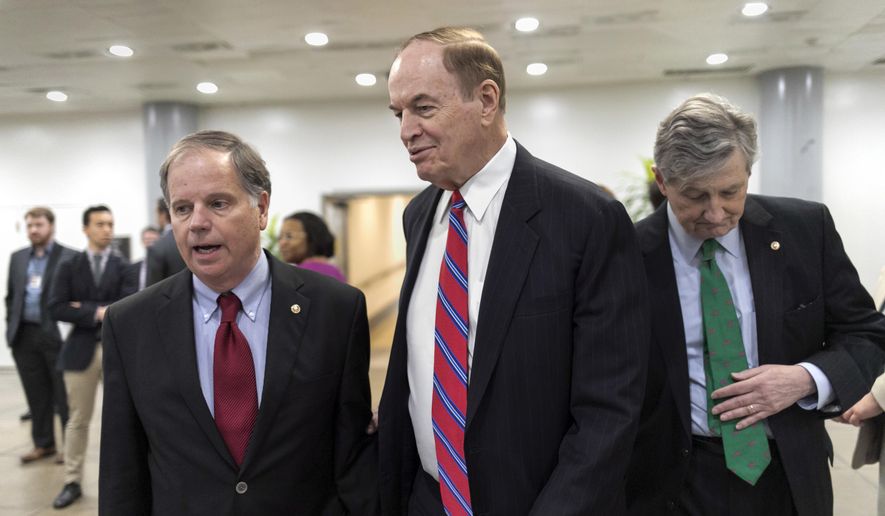As the clock ticks down in Congress, Republican lawmakers are racing to load up the end-of-year spending legislation with their own priorities, figuring this is their last chance to push their agenda while they control both chambers.
Numerous proposals including a farm bill, sanctions on Saudi Arabia, and a major prison and sentencing reform package are being eyed as add-ons to the spending bill, which will cover hundreds of billions of dollars of projects across dozens of departments and agencies.
Republican leaders, though, are trying to strip down the add-ons, fearing they would end up costing rather than building support.
“You don’t want to overload the truck,” said Senate Appropriations Committee Chairman Richard C. Shelby, Alabama Republican.
Still, he said, the farm bill, which negotiators are in the process of finalizing, could get tacked on.
Sen. Lindsey Graham, South Carolina Republican, said he wants to add the criminal justice bill in a move to sidestep opposition. Mr. Graham said Friday that the president is on board with the idea.
Democratic leaders have said any final spending bill also should include language protecting the investigation by special counsel Robert Mueller into Russian attempts to influence the 2016 election from interference by President Trump.
Sen. Orrin G. Hatch, Utah Republican and the retiring chairman of the Senate Finance Committee, also said the year-end spending package could be the best way to muscle through a renewal of expired tax breaks that are part of a tax package Republican leaders are struggling to pass through the House.
“We’re looking at everything, but we’re getting down to the wire here, and I don’t know what we can do beyond extenders but I’d like to,” Mr. Hatch said. “And I think we just may be able to, because this is my last chance here.”
The long list of wants is an indication of just how little has been accomplished this year and how worried lawmakers are about making progress in the next Congress. Starting in early January, control of the two chambers will be split between parties.
Though House Democrats are in the minority for now, they have drawn their own lines on the current spending bill.
“We want to protect Bob Mueller, and I’m not going to vote for any spending bill that doesn’t protect Bob Mueller,” Rep. Eric Swalwell, California Democrat, said recently.
House Democrats also say the Trump administration is pressing for $190 million in additional funds for the Department of Health and Human Services to care for immigrant children detained at the border, even though the president has already signed a package that fully funds HHS through September.
“Over my dead body will we provide another nickel for these folks to do what they are doing here,” said Rep. Rosa L. DeLauro of Connecticut, the top Democrat on the House’s health spending subcommittee.
Lawmakers have passed five of the 12 annual spending bills for 2019, which will fully fund close to three-quarters of the federal government’s $1.2 trillion discretionary budget, including the Defense, Health and Human Services, and Labor departments.
But they need to pass seven spending bills covering other agencies such as NASA and the Justice, Commerce, Agriculture and Homeland Security departments to avert a partial shutdown right before Christmas.
Lawmakers on both sides say the major sticking point is Mr. Trump’s demand for $5 billion in border wall money.
House Democratic leader Nancy Pelosi of California said Congress should pass six individual bills for everything but homeland security and then pass a continuing resolution to extend 2018 money into 2019 for homeland security, avoiding a fight over the border wall.
Mr. Trump is unlikely to accept that deal because the 2018 bill included just $1.6 billion for border fencing, well shy of what he says he needs.
Mrs. Pelosi and Senate Minority Leader Charles E. Schumer, New York Democrat, are scheduled to meet with the president at the White House on Tuesday. After that, there should be a clearer picture of what both sides are willing to accept in a final deal.
Like Mr. Shelby, Senate Appropriations Committee Vice Chairman Patrick J. Leahy, Vermont Democrat, says the goal this late in the session is to minimize, not pile on, big-ticket, controversial items.
“He’s had to say ’no’ to some of the things that as a conservative Republican he would have liked. I had to say no to some of the things I might have liked,” Mr. Leahy said of Mr. Shelby on a recent conference call hosted by the group Public Citizen.
• David Sherfinski can be reached at dsherfinski@washingtontimes.com.




Please read our comment policy before commenting.